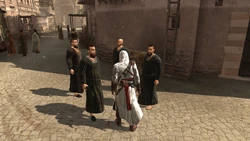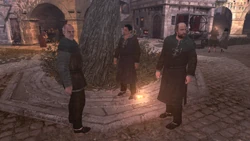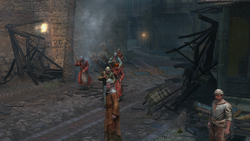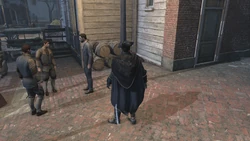(Revised introduction, which was kind of written in OOU language) Tag: sourceedit |
(Rewriting. Brb though.) Tag: sourceedit |
||
| Line 8: | Line 8: | ||
==History== |
==History== |
||
| − | === |
+ | ===Third Crusade=== |
| + | During the Third Crusade, vigilante groups in the cities of [[Damascus]], [[Acre]], and [[Jerusalem]] usually comprised men who opposed the local governance of their cities. They were those individuals who openly stood up to guards or whose friends and relatives found themselves in trouble with the authorities. As such, their interests tended to align with the [[Levantine Brotherhood of Assassins|Levantine Brotherhood]] of Assassins. Assassins such as [[Altaïr Ibn-La'Ahad]] frequently went out of their way to rescue civilians harassed by guards, and in gratitude, these citizens' families and friends would pledge to protect him in turn at their own peril. <ref name="AC">''[[Assassin's Creed]]''</ref> |
||
| − | Vigilante groups were usually made up of the friends or family members of female [[Civilians|citizens]] who had been rescued from harassing guards by [[Altaïr Ibn-La'Ahad]]. The rescued citizen would often thank the Assassin, and assure him that their husband, brothers, friends or neighbors would be sure to hear of his kind deed.<ref name="AC">''[[Assassin's Creed]]''</ref> |
||
Subsequently, if Altaïr was being pursued by guards or chasing an assassination target, the vigilantes would grab them by the arm and prevent them from moving. This allowed the Assassin to either make his escape, dispose of his pursuers or assassinate his target. Should Altaïr pass by the group of vigilantes when not being pursued, they would greet him, and say such things as ''"Thank you for saving my daughter,"'' or ''"If you need me, I am here."''<ref name="AC" /> |
Subsequently, if Altaïr was being pursued by guards or chasing an assassination target, the vigilantes would grab them by the arm and prevent them from moving. This allowed the Assassin to either make his escape, dispose of his pursuers or assassinate his target. Should Altaïr pass by the group of vigilantes when not being pursued, they would greet him, and say such things as ''"Thank you for saving my daughter,"'' or ''"If you need me, I am here."''<ref name="AC" /> |
||
Revision as of 03:04, 28 June 2017
- "You do realize the Assassin will gut you in the very near future? Well, those of you he doesn't drain, castrate, behead, or drop from high places, that is!"
- ―A vigilante taunting a guard.[src]

Altaïr with a group of vigilantes in Damascus
Vigilantes are individuals acting to protect civilians without legal authority. These deeds may be in the capacity of law enforcement, helping to apprehend criminals without the supervision of police.
Historically, vigilantes have also opposed the interests of authorities they deemed oppressive. In both the Third Crusade and the Renaissance, local vigilantes assisted the Assassins, obstructing guards that pursued them. In many cases, their support for the Assassins stemmed from gratitude for the Brotherhood's meritorious deeds, such as rescuing their friends and families or liberating a district of Rome from the House of Borgia.
History
Third Crusade
During the Third Crusade, vigilante groups in the cities of Damascus, Acre, and Jerusalem usually comprised men who opposed the local governance of their cities. They were those individuals who openly stood up to guards or whose friends and relatives found themselves in trouble with the authorities. As such, their interests tended to align with the Levantine Brotherhood of Assassins. Assassins such as Altaïr Ibn-La'Ahad frequently went out of their way to rescue civilians harassed by guards, and in gratitude, these citizens' families and friends would pledge to protect him in turn at their own peril. [1]
Subsequently, if Altaïr was being pursued by guards or chasing an assassination target, the vigilantes would grab them by the arm and prevent them from moving. This allowed the Assassin to either make his escape, dispose of his pursuers or assassinate his target. Should Altaïr pass by the group of vigilantes when not being pursued, they would greet him, and say such things as "Thank you for saving my daughter," or "If you need me, I am here."[1]
Vigilantes in Acre would usually wear simpler clothes, with ragged brown coats, caps and pants. Vigilantes in Damascus and Jerusalem wore better clothes, usually plain black tunics.[1]
Renaissance

A group of vigilantes in Rome
During Ezio Auditore da Firenze's attempts to retake Rome, several vigilantes began to support his actions. After he destroyed Borgia Towers, small groups of vigilantes would gather in the district, shouting insults at nearby guards, and ready to aid Ezio at any time.[2]
Aside from directly assaulting the guards, they could also hide him from them. After successfully helping Ezio against an attack, they would disperse from the area, and only gather again at a later time. Though vigilantes did not address Ezio should he walk past, they would often speak complaints against the Borgia, and praise for the Assassins.[2]

Ottoman Vigilantes near the Arsenal
In Constantinople, when Ezio stirred a riot at the Harbor of Theodosius, several vigilantes chose to fight against the Janissaries. Though unarmed, or wielding only pitch forks, many risked their lives to protest the tyranny of the guards.[3]
Once the rioters had broken through the gate and into the Arsenal itself, Vigilantes could be seen fighting both the Elite soldiers and Janissaries inside.[3]
Colonial America

Haytham by a group of vigilantes in Boston
During the American Revolutionary War, vigilantes would assist Haytham Kenway and Ratonhnhaké:ton. Liberating regions from the Templar influence prompted them to gather around certain areas. Like in the Middle Ages and the Renaissance, they would shout insults at the nearby guards.[4]
The vigilantes would not only grab and stop attacking soldiers directly, but hide Haytham and Connor, by allowing them to blend with the group. If they were attacked, it would cause them to disperse, but following an attack they would quickly move back to their original area.[4]
Along with ordinary vigilantes, rioters have also appeared in the cities, gathering the surrounding citizens to cause a commotion. This would distract soldiers away from certain areas and allow Connor to slip by. These rioters could also be provoked by Assassin recruits.[4]
During the Boston Massacre, the rioters gathered and began shouting at the British soldiers because of their unfair treatment. This drew away all the guards' attention in the district, as most were busy with keeping order. Eventually though, the soldiers began shooting upon the civilians and killing them.[4]
Later, Stephane Chapheau went on a riot through Boston in his irritation at the British before he joined the Assassins. Through this, he gathered a lot of attention of British soldiers in the district, as well as provoked other civilians to riot as well.[4]
French Revolution
During the French Revolution in Paris, vigilantes were typically courageous and moderate revolutionaries, and their attires resembled that of the workers and low bourgeoisie members. They and Extremists clashed frequently, and through most of Paris, they could be seen in open combat.
Unlike their medieval, Renaissance and colonial counterparts, the Parisian revolutionaries would no longer delay an enemy, but rather directly fight them with swords and firearms.
The vigilantes' presence in a district would increase considerably if tasks for the Assassin Council were carried out in the area, with each task "liberating" a sub-district. A liberated area would feature a larger number of vigilantes and a limited number of extremists.[5]
Trivia
- A guard held by a vigilante could not move or defend himself, allowing Altaïr or Ezio to easily kill or shake the pursuers.
- Vigilantes could hold guards for around five seconds before the guard broke free, although it was possible for the guard to be grabbed again immediately afterward.
- Any guard, regardless of health or type, could be grappled by vigilantes. Even some assassination targets were vulnerable to them.
- If all of the pursuers were killed with the assistance of vigilantes, the group would disperse, and could not be used again until the area was revisited.
References
| ||||||||||||||||||||||||||||
